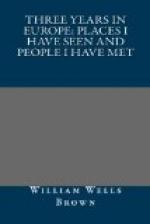The finest thing in the Exhibition, is the “Veiled Vestal,” a statue of a woman carved in marble, with a veil over her face, and so neatly done, that it looks as if it had been thrown over after it was finished. The Exhibition presents many things which appeal to the eye and touch the heart, and altogether, it is so decorated and furnished, as to excite the dullest mind, and satisfy the most fastidious.
England has contributed the most useful and substantial articles; France, the most beautiful; while Russia, Turkey, and the West Indies, seem to vie with each other in richness. China and Persia are not behind. Austria has also contributed a rich and beautiful stock. Sweden, Norway, Denmark, and the smaller states of Europe, have all tried to outdo themselves in sending goods to the World’s Fair. In Machinery, England has no competitor. In Art, France is almost alone in the Exhibition, setting aside England.
In natural productions and provisions, America stands alone in her glory. There lies her pile of canvassed hams; whether they were wood or real, we could not tell. There are her barrels of salt, beef, and pork, her beautiful white lard, her Indian-corn and corn-meal, her rice and tobacco, her beef tongues, dried peas, and a few bags of cotton. The contributors from the United States seemed to have forgotten that this was an exhibition of Art, or they most certainly would not have sent provisions. But the United States takes the lead in the contributions, as no other country has sent in provisions. The finest thing contributed by our countrymen, is a large piece of silk with an eagle painted upon it, surrounded by stars and stripes.
After remaining more than five hours in the great temple, I turned my back upon the richly laden stalls and left the Crystal Palace. On my return home I was more fortunate than in the morning, inasmuch as I found a seat for my friend and myself in an omnibus. And even my ride in the close omnibus was not without interest. For I had scarcely taken my seat, when my friend, who was seated opposite me, with looks and gesture informed me that we were in the presence of some distinguished person. I eyed the countenances of the different persons, but in vain, to see if I could find any one who by his appearance showed signs of superiority over his fellow-passengers. I had given up the hope of selecting the person of note when another look from my friend directed my attention to a gentlemen seated in the corner of the omnibus. He was a tall man with strongly marked features, hair dark and coarse. There was a slight stoop of the shoulder—that bend which is almost always a characteristic of studious men. But he wore upon his countenance a forbidding and disdainful frown, that seemed to tell one that he thought himself better than those about him. His dress did not indicate a man of high rank; and had we been in America, I would have taken him for an Ohio farmer.




